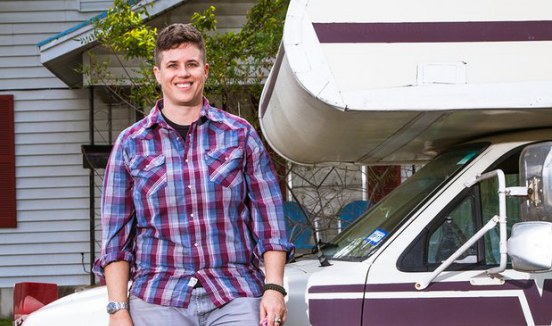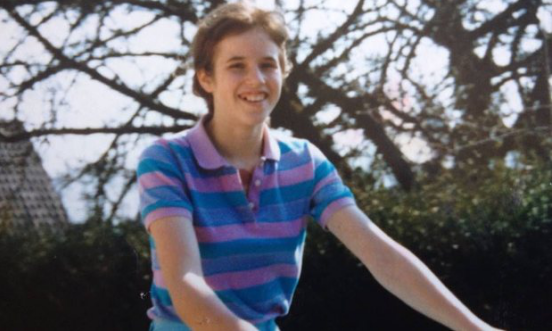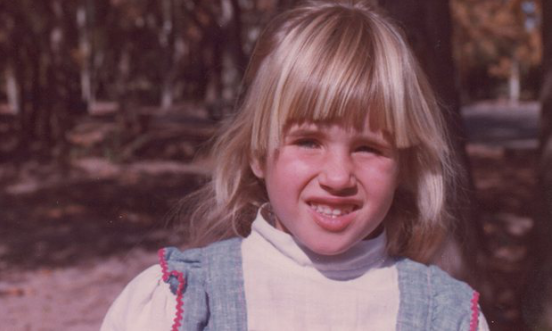
Lauren Hough in Austin, Texas. ‘I realised you could take a terrible thing and make it worth reading.’ Photograph: Phil Kline for the Observer.
My name is Lauren Hough. I was raised by the Family, the global religious cult that started in California in the 1960s. When I met Ruthie after leaving the cult, I was crossing the country in a tiny Winnebago because this is the sort of brilliant idea you get when you can’t sleep.
We were 13 the last time Ruthie and I saw each other. Her name was Faithy back then and I wasn’t allowed to talk to her. In fact, I wasn’t allowed to talk to anyone, because the last time I saw her we were both still in the Family and we were in serious trouble.

Hough in Elgg, Switzerland in 1991 while she was living with the Family.
"Punishments came and went like any fad in the outside world. Silence restriction and sign-wearing were the new tactics"
When I was in the cult ,one night, a home shepherd called Auntie Mercy shook my shoulder to wake me. She didn’t say a word, only turned, and I followed her down the stairs.
The other home shepherds were in the dining room along with the shepherd for my age group, Uncle Stephan;he said: “Have a seat, sweetie.” When a word like sweetie, so innocent and saccharine, slips out of the wrong mouth, you’ll wish you were wearing pants. I sat in the chair facing them, and rubbed my eyes, acting sleepy to buy time.
“Do you have anything to tell us?”
I started small with the confessions. I’d played this game before. “I haven’t been putting my heart into my chores,” I said. If I got it right on the first guess, they’d just keep digging for more. I would give them anything. I would have to.
But I wasn’t giving up my radio that I found when I had been tasked to clean up random items someone had given up to follow Jesus.We could pick up Armed Forces Radio.The radio brought music and words that made us feel hope and loss. Then a few weeks into our nightly listening party, Auntie Mercy caught Faithy in my bed. We’d accidentally fallen asleep. Auntie Mercy didn’t see the radio, but she told us she’d better not catch us again.
Silence restriction and sign-wearing were the newest tactics in arbitrarily inflicted punishment. Silence restriction is pretty simple to understand. Then we wore signs around our necks made of cardboard or plywood with catchy slogans like “Silence restriction” or “I need to count my blessings” or “Please remind me to smile” – that last was being worn by an eight-year-old whose desire to smile remained unchanged. Punishments came and went like any other fad in the outside world but favourite methods included writing essays, memorising chapters of the Bible, a paper-clip daisy chain wrapped around your head and then hooked to each cheek to force a smile, running laps around a driveway, pointless manual labour, isolation, public beatings, bread-and-water diets. These, usually in some combination, could last days or months and there was no way to tell which way it would go.

Hough aged about five, in Chile. Photograph: Courtesy of the author
"After the first hour, I ran out of things to confess. I was tired and confused. I didn’t know what they wanted"
“What else?” asked Uncle Stephan. His eyes were cold and blue and he had this German accent, which was perfect, really.
I had tried to avoid him, but avoiding him was impossible. I hadn’t seen any Nazi movies or I might have known that he fitted the mould, like a caricature. His eyes terrified me.
Despite only wearing a thin undershirt, I wasn’t cold. Still, I folded my arms over my chest and shivered.
“I was foolish. I told some jokes I know,” I said.
“What else?”
After the first hour, I ran out of things to confess. I was tired and confused. I stopped talking. I didn’t know what they wanted. I closed my eyes and I was quiet when I heard his boots on the tiled floor.
Uncle Stephan always wore boots in the house. No one else ever did.
Grandpa didn’t like wearing shoes indoors because shoes dragged filth inside and evil spirits could hitchhike on shoes and clothing.
Grandpa was David Berg, the founder of the Family. The adults called him Dad, which was as confusing as it sounds. In another reality, another time, he’d have been locked up in an institution. In my reality and time, he founded a cult.
I felt Uncle Stephan’s breath on my face for a moment. Then he slapped me hard across the face. I heard the shepherds praying for me again, or maybe they were praying against me. I felt my lip with my tongue and tasted blood. I didn’t know where my parents were or if they knew what was happening. I didn’t dare ask.
I opened my eyes and met his across from me. I hated him.
Uncle Stephan had already put me on silence restriction for a month. I’d only recently been allowed to talk again. We hadn’t seen a movie all year because we weren’t “following the spirit”. It’s not like we ever watched anything but musicals anyway, but those were better than the nothing we had now. He liked public punishments. And he used a bamboo cane he carried around with him. Spanking wasn’t anything unusual, but his cane, which broke skin, only happened behind closed doors. Most of the time they just used a belt or a paddle.
So I stared at his eyes and I didn’t blink and I wanted him to see I wasn’t crying. I knew he’d break me. They hadn’t broken me yet but it was inevitable. All I wanted in that moment was for Uncle Stephan to know that breaking me wouldn’t be easy. I looked above Uncle Stephan’s head and saw a poster of Jesus. This wasn’t the blond, friendly Jesus.
This Jesus was coming down from heaven on a horse, surrounded by the flames of a burning Earth.
If the shepherds had watched any cop shows before they dropped out to follow Jesus, they would have known the proper way to do an interrogation. While I sat in the dining room and tried to figure out what the shepherds wanted from me, Faithy was in the shepherds’ office upstairs and probably wondering the same thing. They didn’t know they were supposed to tell me Faithy was upstairs and I should tell them everything before she cut a deal. But then again, there were no deals in the Family. Confession, while possibly good for the soul, was not good for my immediate future.
I couldn’t think of any more small crimes. So I just started making shit up.
“I took some apricots from the pantry.”
“Why?”
“I was hungry and there were lots so I thought it was OK.”
“What else?”
“I murmured about having to watch the kids instead of going postering last Saturday.” That was a lie, but a lie that might work in my favour. I liked taking care of the little kids. Plus, my mom was in charge of them so being assigned to help with the little kids meant spending the day with her while most of the home was out raising money by selling posters or knocking on doors and asking for donations.
“What else?”
"The Romans came that night. But they were too late. Someone tipped off a reporter who tipped off the home shepherds"
Six hours later, the sun was up and I could hear the home stirring upstairs. The kids assigned to make breakfast walked around the circle of shepherds and me. The kids looked straight ahead as they passed. There was a time when I might have felt humiliated. But we were used to public punishments now so I didn’t mind them seeing me. We’d all been in this chair at some point. Those who hadn’t knew it was only a matter of time.
The shepherds either had what they wanted from me or gave up trying. Auntie Mercy wanted to pray again. This time I had to hold their hands and the words she prayed told me this was just the beginning of my ordeal.
A few weeks later, still in the attic where they’d decided to store problem kids like me, where we’d read the insane ramblings of our drunken prophet, where they expected us to report every thought that passed through our heads, where the beatings happened daily, I broke. It sounds more like a sigh than the shattering you feel in your soul. I remembered how it didn’t hurt when I broke, how it was easier after.
The Romans came that night. But they were too late. Someone tipped off a reporter at the local newspaper, who tipped off the home shepherds. Before the sun rose, we quietly crammed ourselves into vans, kept our heads below the windows, and our shepherds drove us to the next home.
Faithy didn’t come to the new home and I knew better than to ask where she’d gone. And now, this woman named Ruthie, with Faithy’s face and voice, was asking me about the radio. “Did they ever find it?”
“You didn’t rat me out,” I say. No, they never found the radio.
“But then why did you get in so much more trouble than I did?” she asks.
“I wondered about that for years. But you know how it goes, you just stop thinking about it. Then one day, I was telling my girlfriend about the radio and I finally figured it out. They thought I was gay.”
But at 13, I wasn’t yet a lesbian, or anyway I didn’t know it. Back then I was just an awkward tomboy.
She shows me pictures of her husband, her kids. I show her pictures of my dog. We talk all afternoon.
And we don’t have to explain. We remember.
Q&A with Lauren Hough
Hough, 39, was born in West Berlin and brought up in the Family, founded by David Berg in 1968 in California and originally known as the Children of God.
Where do you live now?
In Austin, Texas. I’ve only been here a couple of months. I sold my house in Washington DC last year and I’ve been travelling in my camper. A couple of months in Portland, Oregon and Berlin and now I’m here. I’ve enjoyed it tremendously, but I’ve rented a house in Santa Fe and I’m moving there in a couple of weeks.
You moved around a lot with the Family?
We travelled around in campers, caravans, lived in tents. We moved to Chile for a couple of years when I was four. Japan for a few years too, then Switzerland and then Germany.
It must have been quite something when you left.
Oh God, yes. I was done. I just couldn’t figure out how to leave on my own. I would think about it… do I run to the embassy? How can I get my passport? Then one day Mom just told us to pack. There was absolute relief and absolute terror – we stayed in Munich for a couple of weeks and my brother and I were convinced we were going back in. But we didn’t. My grandmother took us into her little house in west Texas.
What made your mother decide to leave?
Mom was worried that we’d had absolutely no education and that she couldn’t protect me. My stepdad was just frustrated that they were never going to make him a leader.
Why did your parents join the Family?
My mom was upset about the Vietnam war. She was a hippy, protesting and everything else, and here were people who were actually doing something – dropping out, leaving society, following Jesus. The way she saw it was, yeah, a great, utopian thing. She met my father and he was there for much the same reason. He was travelling around so he wouldn’t get a draft card. My mom doesn’t talk about the Family and I don’t ask her about it. We’re close, but only so much. I only recently talked to my dad about it [Hough’s parents split up when she was 7]. We’re close now. We weren’t always.
You don’t blame them for what happened?
Well, I know what an idiot I was when I was 19, the age they were when they joined. It’s kinda hard to hold it against someone.
How have you felt since coming out? Have you had a lot of therapy?
Not so much and most of it wasn’t so helpful. I’ve had therapists cry and hug me and it was really strange. They just don’t really know what to do with it. I mean, I still hide things. I still have nightmares, I can’t deal with crowds. I will always feel kind of separate. For a long time, I just didn’t really have friends. In high school, I had no idea how to talk to people. I didn’t understand cultural references. Ninety per cent of conversations are: “Hey, do you remember that episode of Seinfeld?” and shit. And I was weird, I was just awkward. I read everything I could get my hands on. It’s just what I did, I hid in books.
Which books particularly?
On the Road: the book that made me want to write. The Liars’ Club by Mary Karr. The Glass Castle [by Jeannette Walls] – reading this, I realised you could take a terrible thing, that bad thing in every memoir, and make it worth reading. There’s no self-pity in it.
Do you know what has become of the so-called “Shepherds”?
Oh, God… thank God, no. “Uncle Stephan” – the last anyone saw he was holding a cardboard “The End Is Near” sign in Amsterdam. I mean, some of these people are my friends’ parents. We’ve all reconnected through Facebook. But… I stay away from the subject of whose parents did what to whom and I will meet them but not their parents. There’s a very clear line drawn between who we associate with. Second-generation people versus the people who joined. We have our secret Facebook groups where we can talk. We kind of provide our own free therapy.
What’s next?
I’d like to write more. I don’t know if I can support myself doing this but I’m working on a book – a memoir trying to put it all together.
Interview by Ursula Kenny
Source:
https://www.theguardian.com/society/2016ov/27/family-religious-cult-former-member-recalls-experiences





